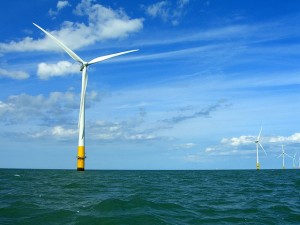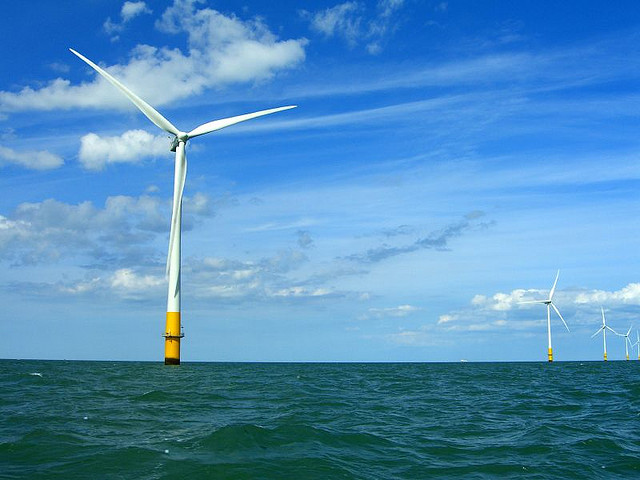Rhode Island has designated ocean waters for certain uses – and a coastal lawyer predicts such zoning is coming to a Great Lake near you.
But several Great Lakes officials disagree.
The Rhode Island program, Ocean Special Area Management Plan, designates zones to protect fragile ecosystems and has rules telling people what they can do in the water.
The zoning program was done, in part, to foster offshore wind energy development.

Rhode Island's marine zoning is partly an effort to foster offshore wind energy projects. Photo: phault (Flickr)
“Just like a zoning law zones land, you can do the same in the water … officials can prohibit certain things and encourage others,” said John Boehnert, a Rhode Island lawyer specializing in coastal permitting and environmental law.
The regulations extend to the state-owned three nautical miles offshore.
In a recent American Bar Association article, Boehnert predicted Great Lakes waters would also soon be zoned like land.
Some Great Lakes officials aren’t buying it.
“We have no interest in zoning,” said Jennifer Day, a Great Lakes regional coordinator for the National Oceanic and Atmospheric Administration.
Her agency is mapping the public and private uses and environmentally sensitive areas of Great Lakes waters and coasts. But it is not regulating them.
“Knowledge of all of the uses and regulations in waters in one place allows states to engage with developers and industry and identify places of little conflict,” Day said. “But it will be a tool for people – not restrictions and regulations.”
In Rhode Island, a developer spent a lot of money on an offshore wave and wind energy project only to find out the project was in a channel used by naval submarines, Day said. That prompted a coastal inventory and the subsequent zoning.
“A lot of people see the coastal and marine areas as the new Wild West where anything goes,” Day said. “The desire to develop offshore is growing and we need to be prepared for that.”
Todd Main, program manager at the Illinois Coastal Management Program, is aware of zoning fears in the region, but doesn’t think it’s likely.
“There is certainly a new emerging consensus that as a region we need to work together,” Main said. “But I don’t get the sense that means there’ll be zoning of any kind.”
In July 2010, President Barack Obama signed into law a National Ocean Policy with objectives for managing coastal areas — including the Great Lakes coasts – for business and development. This is also spurring the marine and coastal inventory.
The Great Lakes region is in the nascent stages of developing a marine and coastal inventory. It’s probably a year down the road, Day said. She points to Ohio for a glimpse of what might happen.
That state has a suite of maps and information on water and coastal uses, including wind energy resource maps.
“We’re just showing people the best places to find the least resistance from other uses of the lake,” said Brenda Culler, spokesperson for Ohio’s Office of Coastal Management. “We have information that would maximize the good aspects of our resources … but were not requiring people to follow those.”
Ohio’s program was spurred in part by wind developers, Culler said. But it’s really a “tool to show where good places would be for different uses and minimizing conflicts.”
Culler is among the officials who don’t see zoning coming to the Great Lakes anytime soon.
Day says the efforts are not a case of unwarranted government intrusion.
”People think we’re going to dictate what goes on in every part of the lake and were not going to do that,” she said.
